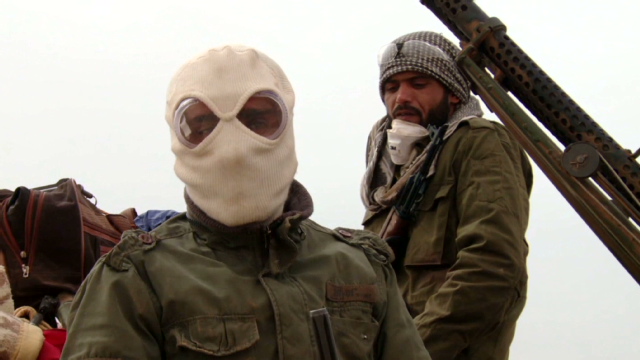 (CNN) -- The key Libyan city of Ajdabiya, the last major point between pro-government forces and the opposition stronghold of Benghazi, was slipping from the opposition's hands Tuesday, witnesses reported.
(CNN) -- The key Libyan city of Ajdabiya, the last major point between pro-government forces and the opposition stronghold of Benghazi, was slipping from the opposition's hands Tuesday, witnesses reported.
Forces loyal to Libyan leader Moammar Gadhafi fired artillery into Ajdabiya, and there were eyewitness reports of at least two airstrikes on the city. If Ajdabiya is retaken by pro-Gadhafi forces, it would give access to roads leading to the heart of the opposition's base.
Opposition fighters in Ajdabiya returned fire with anti-aircraft weapons and rocket-propelled grenades, but eventually had to pull back their defense positions. Gadhafi's forces approached the city from the south and the west, witnesses said.
Libyan state television reported Tuesday evening that "Ajdabiya has been cleansed from mercenaries and terrorists connected to al Qaeda."
Appearing to contradict that report, Khaled al-Sayeh, a spokesman for the opposition military forces, said Gadhafi's forces had reached the western outskirts of Ajdabiya. The spokesman said a small unit of government forces had entered the city Tuesday but were repelled by opposition fighters.
Sayeh said opposition forces deployed planes and naval assets to strike at the advancing Gadhafi battalion and capture an oil tanker registered to "Hannibal Gadhafi." The tanker was carrying 25,000 tons of fuel. Sayeh said the opposition also attacked three oil tankers that Gadhafi had converted into battleships and sank two of them.
However, the spokesman said the opposition's ability to mount an air defensive was limited and said the imposition of a no-fly zone was paramount.
Without implementation of a no-fly zone, rebels fear that it is only a matter of time before there is a bloodbath in Benghazi.
Lebanon's U.N. representative distributed a draft resolution Tuesday calling for the imposition of a no-fly zone on Libya to members of the U.N. Security Council. The council is scheduled to take up the matter Wednesday morning.
Meanwhile, pro-Gadhafi forces wrested control of the town of Zuwara from rebels, an opposition spokesman and a witness said.
Pro-Gadhafi forces with tanks and heavy artillery forcibly entered Zuwara on Monday, clashing with rebels for several hours before subduing the town, the sources said.
Troops entered the town about 9 p.m. and began shooting randomly into buildings, the opposition spokesman said, declining to be named for his safety. He is in Zuwara.
Tuesday morning troops announced they were in control, the spokesman said.
The town was relatively quiet Tuesday, with locals afraid to leave their homes, he and the witness said.
Gadhafi is fighting to regain his dominance over the entire country after some towns and cities came under control of the armed opposition.
Zuwara is west of the capital, Tripoli, which Gadhafi controls. The rebels' stronghold of Benghazi is to the east of Tripoli.
Rebels had appeared Monday to have slowed the eastward advance of government forces toward Benghazi at the town of al-Brega.
But it was not clear late in the day who controlled al-Brega, which contains a large oil refinery and natural gas plant, said CNN's Ben Wedeman, reporting from Benghazi, which is about two hours further east.
For the first time since violence erupted last month, forces opposed to Gadhafi did not allow members of the news media to go forward. They expressed concern that coverage from the rebel side of the lines could provide intelligence to government forces about the ragtag rebel forces' tactics, or lack thereof.
Life in Benghazi appeared calm on the surface Monday. Stores were open, and people went about their business. But some residents expressed an underlying fear that Gadhafi appeared to have gained the upper hand and was advancing his military forward as much of the rest of the world focused on the catastrophe in Japan.
Some expressed fear that Gadhafi may seek to block roads leading to Benghazi and other coastal cities, then lay siege to them. Some worried that, if Gadhafi reasserts control of those cities in eastern Libya that led the revolt against his rule, he might carry out bloody reprisals.
Forces loyal to Gadhafi have been fighting to recapture towns from the rebels since the uprising began last month.
En route to Washington after a weekend trip to Bahrain, U.S. Defense Secretary Robert Gates said Monday that the logistical challenges of enforcing a no-fly zone over Libya could be overcome. "If we are directed to impose a no-fly zone, we have the resources to do it," he said.
"The question is whether it's a wise thing to do. And that's the discussion that's going at a political level."
However, the chances that the U.N. Security Council will adopt a no-fly zone are in doubt because of resistance from some council members.
The Arab League voted Saturday to back a no-fly zone over Libya to protect the civilian population.
The Libyan Foreign Ministry has denounced the league's move, calling it a "flagrant action against its charter."
U.S. Secretary of State Hillary Clinton said Tuesday that the United States is consulting with the Arab League regarding goals tied to the establishment of a no-fly zone.
"We understand the urgency of this" and are exploring new ways to help opponents of Gadhafi, Clinton said during a visit to Egypt. But ultimately there must be support in the U.N. Security Council for any international action, she said.
CNN's Arwa Damon, Joe Vaccarello. Yousuf Basil and Reza Sayah and journalist Mohamed Fadel Fahmy contributed to this report.



